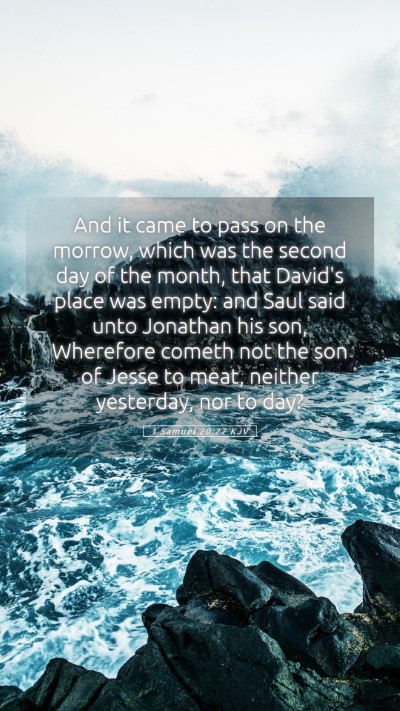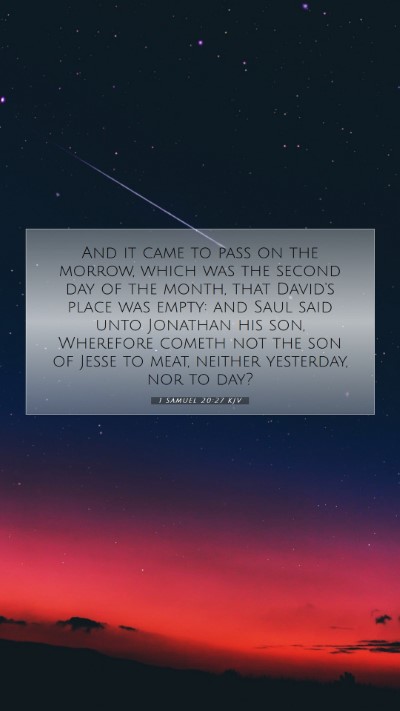Understanding 1 Samuel 20:27 - A Comprehensive Commentary
1 Samuel 20:27 says, "And it came to pass on the morrow, which was the second day of the month, that David’s place was empty: and Saul said unto Jonathan his son, Wherefore cometh not the son of Jesse to meat, neither yesterday, nor to day?" This verse is pivotal in capturing the growing tension between King Saul, his son Jonathan, and David. Let's explore its meaning through various insights and commentaries.
Contextual Background
This verse occurs in a critical narrative where David is hiding due to Saul's increasingly hostile intentions. Jonathan, Saul's son and David’s close friend, seeks to ascertain Saul's feelings towards David. This setting is key to understanding the unfolding drama of loyalty, friendship, and divine purpose.
Verse Analysis
The following points are drawn from commentaries to elucidate the significance of this scripture:
-
Matthew Henry's Commentary:
Matthew Henry emphasizes the seriousness of David's absence, interpreting it as both a sign of danger for David and a reflection of Saul's growing paranoia. Saul's inquiry about David's absence indicates his awareness of the political implications. Henry points out that this verse marks a critical moment where David's fear for his life has escalated into a tangible threat.
-
Albert Barnes' Notes:
Barnes provides insights into the implications of Saul's questioning. David’s absence signifies the deepening rift between Saul and David, suggesting that Saul's suspicion is warranted. Barnes notes that Saul's mention of David as “the son of Jesse” shows disdain and a kingship’s confrontation, highlighting the envy Saul harbors towards David which ultimately leads to more drastic actions.
-
Adam Clarke's Commentary:
Clarke reflects on the nature of familial conflict illustrated by this verse. Jonathan, caught between his father Saul and his friend David, navigates a precarious situation. Clarke remarks that this absence at the feast symbolizes the larger theme of betrayal and the conflict between personal loyalty and familial duty.
Spiritual Lessons and Applications
The analysis of 1 Samuel 20:27 reveals broader spiritual lessons:
-
Loyalty and Friendship:
This passage reveals the profundity of true friendship as Jonathan seeks to protect David at great risk. It challenges readers to evaluate their relationships and the cost of loyalty.
-
Divine Intervention:
David's escape from Saul is indicative of God's providence and plan. This encourages believers to trust in divine protection during trials.
-
Conflict Resolution:
The tension between Saul and David suggests the need for wisdom in handling conflicts, especially when they arise from misunderstandings and jealousy.
Cross References
Related scriptures that enhance understanding of 1 Samuel 20:27 include:
- 1 Samuel 18:6-9 - The origin of Saul’s jealousy towards David.
- 1 Samuel 19:1-3 - Jonathan’s role in warning David.
- 1 Samuel 20:30-34 - Saul's anger toward Jonathan and David.
Conclusion
In summary, 1 Samuel 20:27 encapsulates a critical point in the narrative of David's rising conflict with Saul. Understanding this verse through various commentaries provides a multidimensional view of loyalty, conflict, and the unfolding divine destiny for David. For those engaging in Bible study groups or utilizing Bible study tools, this verse offers rich material for reflection and discussion. Those seeking commentary on specific Bible verses can appreciate the depth and implication this text holds in both historical and modern contexts.


